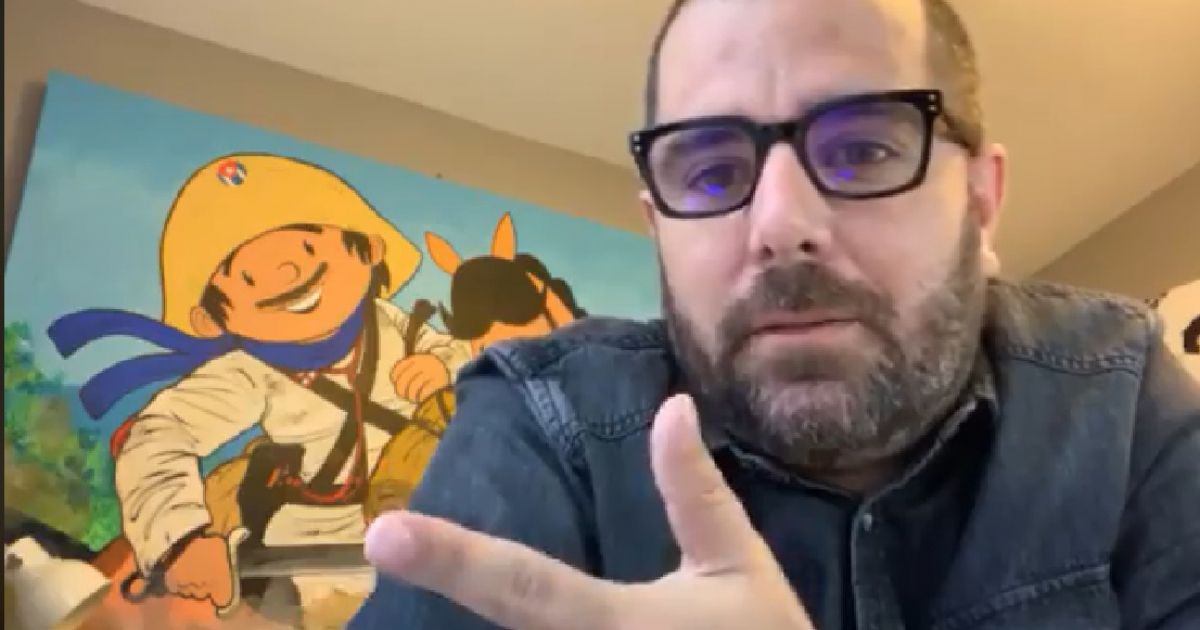
2 | 01/02/2021 – 06:29 (GMT-4)
Cuban director Ian PadrónHe recalled in an open letter due to events in the Ministry of Culture (MINCULT) that his father was one of the creators of censorship by the Cuban government.
Ian begins his narrative by explaining that In 2003, ICAIC censored its documentary Outside the league, about Cuban baseball. He spent months looking for dialogue with the institution, but received silence in response and that the “absence of debate” led to ongoing events of intolerance of officials that culminated in verbal and physical attacks against him in the ICAIC lobby.
“In the middle of that” storm, “my father Juan Padrón He asked me not to be paralyzed by these unfortunate events. Then I spoke for the first time about something that was very revealing to me: he was censored and underestimated at one point, like other greats he admired like Pablo Milanés, Silvio Rodriguez, Pastor Vega or Pedro Luis Ferrer“, Says the filmmaker on his Facebook profile.
Ian says his father ended that conversation excitedly. “The only real victory I had in the face of misunderstanding was to continue to create. Trust the Cuban public and in time; they are the ones who will always have the last word “, Juan Padrón told him.
In his message, Ian also referred to some figures and institutions in the cultural sphere in Cuba, which were sometimes positioned in favor of those he classified as “incomprehensible”.
“As far as I’ve investigated, people like Haydeé Santamaría have promoted spaces from House of America in favor of the “misunderstood”. Given this example, other institutions have taken the risk of giving space to those artists who have been marked as “maladapted” or “who have played the enemy’s game.” That’s why today there are vampires in Havana, El Unicornio azul, Ojalá, Yolanda, Elpidio Valdés, The Short Space You’re Not In, The Portrait of Teresa, 100% Cuban and La vaquita Pijirigua among many similar examples. Essential references in national culture, the result of those same artists previously labeled as “conflicting”, “Ian said.
However, the reaction Casa de Las Américas, in light of the events of January 27He was not in favor of dialogue or in support of young protesters, as can be read from a message broadcast by the portal Window where he defined what happened as “part of a challenging and destabilizing scenario created to confuse.”
Silvio Rodriguez, in the meantime, He preferred to close his eyes, indicating that he could not see the videos showing violence by state officials against peaceful protesters.
The Cuban singer-songwriter, Pedro Luis Ferrer, on the other hand, publicly expressed his deep rejection use of force by MINCULT workers. He stressed that the palms (with a clear reference to the attitude of Alpidio Alonso) serve to avoid discussing what is not appropriate and said that he is sad and very concerned about the “spiritual destiny” of the Cuban people.
One of the concerns Ian Padrón has about events that took place on January 27 in front of the MINCULT headquarters this is because pro-government media describe young protesters as “mercenaries”.
“Calling him a mercenary is a very serious accusation that can have moral consequences for him, his family and friends. I know first hand,” Padrón said.
The violent attitude of culture officials, with Minister Alpidio Alonso in charge, the Cuban filmmaker interpreted it as an awkward statement by MINCULT that he no longer wants demonstrations in front of his headquarters.
In this sense, he considers that it is something “congruent with today’s Cuba”. However, he believes that from that time until the arrest and attempt to label all those who were there as “employees of the empire” there is a generalization that can become “dangerous.”
Ian wonders what will happen to all the people who could be acquitted of such charges; and whether there are really possibilities for dialogue in Cuba under the terms of the indictment without the right to answer.
In the same way, he takes advantage of his open letter to call for reflection, both for Cuban artists and for state institutions.
“I ask Cuban artists to delve into everything that has happened and the cultural institutions that” do not throw the couch. “Try to get to know these people who were there, don’t turn your back on them. The rest of the world is full of Cuban “young people” who have not found space in Cuban society and have had to look for other horizons. The vast majority of us are also honest and we will love our country until the end of our days, “said the filmmaker.
“If on the one hand felt threatened by the presence of the police and on the other hand, the institution feels threatened by the filming of the phones; It is an unequivocal sign that the conditions for a real dialogue were not in place. I think both sides have a responsibility to do better in this regard, “he said.
The director considers that “the day the necessary dialogue takes place and you want to show mutual trust; it must be open, with state or foreign cameras and media; without secrecy or distrust of others ”.
Ian Padrón’s message is for those who “still can afford to hear an opinion” and reiterates his rejection of violence by state officials against the group of young independent artists and journalists who demonstrated peacefully on January 27 in front of the MINCULT headquarters.